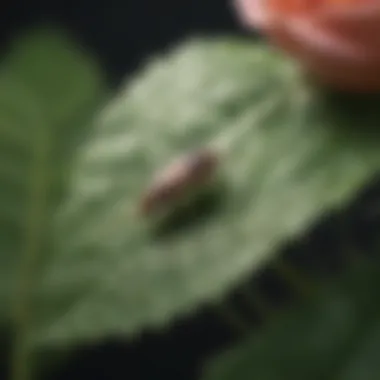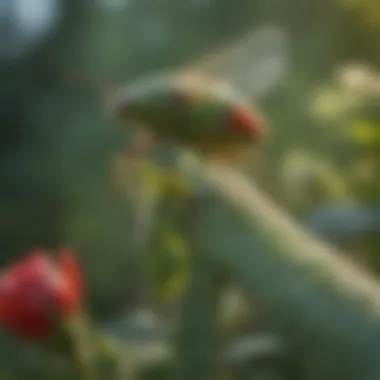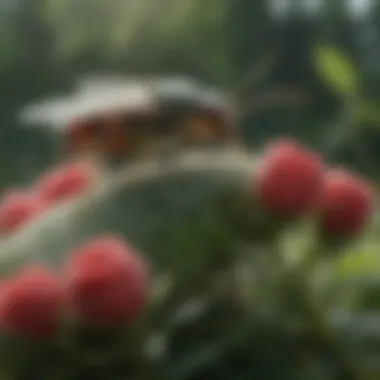Effective Ways to Eliminate Aphids from Roses


Intro
Aphids - tiny, sap-sucking pests that can make a gardener's life difficult. When it comes to rose gardens, these little critters can wreak havoc, turning healthy blooms into wilted husks. For rose aficionados and those merely looking to maintain a vibrant garden, understanding how to tackle an aphid infestation is paramount. This section dives into the core of the issue, outlining the significance of addressing aphid problems effectively.
Each section that follows will explore targeted strategies, both gentle and assertive that you can implement to safeguard your roses, because a healthy rose bush not only adds beauty to your outdoor space but also brings joy and satisfaction to the gardener’s heart.
In this guide, we will explore combined efforts of natural remedies, cultural practices, and when necessary, chemical interventions.
Understanding Aphids
Foreword to Aphids
Aphids are small, soft-bodied insects belonging to the superfamily Aphidoidea. You might find these minuscule pests in various colors, ranging from green, black to even pink. They primarily target the tender new growth of plants, especially the leaves and stems of roses.
Physical Characteristics and Appearance
These creatures are often around 1-10 mm in size and can be recognized by their pear-shaped bodies and long antennae. Their appearance can vary, but it’s the tell-tale clustering on the undersides of leaves that usually gives them away.
Natural Habitat and Distribution
Aphids thrive in many environments, from gardens to farms, and their distribution spans almost all parts of the world, thanks to their ability to reproduce rapidly.
Behavior and Social Interactions
Aphids are social insects, often found in colonies. They communicate with each other through pheromones, which can indicate danger or signal the need for reproduction. The fascinating thing about these pests is their unique ability to reproduce both sexually and asexually, allowing them to increase their population in a heartbeat.
Managing Aphids Effectively
Cultural Practices
Adopting cultural practices can help mitigate aphid infestations before they take root. Practices such as proper plant spacing, adequate watering, and selecting pest-resistant varieties can create an environment less favorable for these pests.
Natural Remedies
Use of natural remedies can be a gardener's best friend. Introducing beneficial insects like ladybugs or lacewings can naturally keep aphid populations in check. Homemade solutions, like a soap spray made from diluted dish soap and water, can also help in eliminating these pests without harming your plants.
Chemical Interventions
When natural methods seem insufficient, you may need to consider chemical treatments. Insecticidal soaps or specific pesticides can provide a more assertive approach. It’s vital to carefully follow the instructions on the labels to ensure the safety of both your plants and surrounding wildlife.
The End
Understanding Aphids and Their Impact on Roses
Aphids, those tiny sap-sucking insects, can wreak havoc on rose plants if not managed promptly. Their presence not only damages the foliage but also disturbs the entire ecosystem of your garden. By understanding these pests—how they work, their lifecycle, and the signs that indicate an infestation—you position yourself better to protect your cherished roses.
When gardeners recognize the importance of identifying aphids, they can significantly reduce damage. These soft-bodied insects often come in various colors like green, black, or even red. Their ability to reproduce rapidly means that a single pair can quickly lead to an infestation. Taking action at the first sign of these pests can make all the difference.
Moreover, understanding aphids' life cycle gives gardeners insight into their behavior and breeding patterns—knowledge that is key for effective control strategies. You may think you've dealt with an aphid issue, only to discover a new wave due to missed eggs or larvae.
Finally, signs of infestation vary, from wilting leaves to the sticky residue known as honeydew left behind. Recognizing these signals early allows you to implement treatments before the problem escalates, preserving the beauty and health of your roses. With this knowledge at hand, you are better prepared to tackle aphids head-on.
"An ounce of prevention is worth a pound of cure." This adage holds particularly true in the realm of gardening, especially when it comes to pests like aphids.
Identifying Aphids
Identifying aphids is crucial for effective management. These pests are notably small, measuring less than a quarter-inch in length. Look closely, and you might spot them congregating underneath leaves or along stem tips. Their body shape is usually pear-like, and they possess long antennae that extend symmetrically from their heads. Depending on the species, they can be green, yellow, brown, or black.
Notably, they have a tendency to cluster in large numbers—just a small seedling can become a dense colony before you know it. If you've got a hunch that aphids might be the issue, gently shaking a leaf can reveal them; if they fall, it's time to muster your defenses.


Life Cycle of Aphids
Understanding aphids' life cycle isn't just academic—it's practical. In general, their cycle begins in the spring when adult females, often pregnant with live young, emerge to munch on new plant growth. Each female can produce a dozen offspring daily in favorable conditions, leading to population explosions in no time.
Aphids reproduce both sexually and asexually, contributing to rapid population growth. Sexual reproduction typically occurs in the fall to ensure genetic diversity. Eggs are laid in the winter, hatching in the warmth of spring, setting the stage for another cycle of infestation. By becoming familiar with this cycle, you can anticipate peak periods for intervention, ideally before they become a significant problem.
Signs of Infestation
Detecting the signs of aphid infestation early is paramount to protecting your roses. Look for symptoms such as:
- Curling Leaves: New growth may start to curl or twist, signaling that something's gone awry.
- Yellowing Foliage: As aphids sap nutrients from the plant, leaves may begin to discolor.
- Honeydew: This sticky substance can attract ants and other pests, and serves as a tell-tale sign of aphid activity.
- Black Sooty Mold: The honeydew can also encourage the growth of sooty mold, which can cover leaves and impair photosynthesis.
Being vigilant is key. Regularly check your plants for these signs, especially during the growing season when aphids are more active. If caught early, you can curb their damaging effects, restoring your roses' vibrancy and health.
Cultural Practices to Deter Aphids
Cultural practices are fundamental in managing aphid populations efficiently and sustainably. By creating conditions unfavorable for these pests, gardeners can significantly minimize the likelihood of infestations on their prized rose plants. Unlike chemical sprays that may pose risks to the broader ecosystem, employing cultural techniques whispers a more harmonious relationship between nature and cultivation. Moreover, these strategies often come with the added bonus of promoting the overall health of the plants, leading to more robust growth and blooming.
Choosing the Right Rose Varieties
Selecting rose varieties that are resistant to aphids can be a game-changer in your garden. Varieties such as Knock Out and Flower Carpet not only brighten up the landscape but also demonstrate a resilience to common pests. These robust cultivars are bred specifically to withstand harsh conditions while keeping pests at bay. In addition, heirloom varieties like Old Blush may also show some degree of tolerance due to their resilience developed over centuries. When you choose wisely, you set the stage for a proactive defense against these sap-sucking nuisances.
Proper Plant Spacing and Air Circulation
Another essential aspect to consider is the physical arrangement of your rose plants. Proper spacing allows for optimal air circulation, which is crucial in keeping aphids from feeling at home. Tight clusters of plants create a damp environment that entices aphids to settle in. When planting roses, aim to leave enough space—generally 18 to 24 inches apart—to ensure air can flow freely and sunlight can penetrate. A well-ventilated garden can also help prevent fungal diseases, a double whammy against pests and pathogens alike.
Maintaining Plant Health
Keeping your roses in peak condition is fundamental for averting aphid invasions. A healthy plant is better able to fend off potential threats. Regular watering—without overdoing it—ensures that plants remain hydrated, but don’t forget the importance of well-draining soil. Adequate nutrients play a pivotal role as well; consider incorporating compost or balanced fertilizers to enrich the soil. Furthermore, inspecting your plants regularly for signs of stress or damage can provide an early warning system, alerting you to tackle issues before they escalate. Aphids prefer weak and unhealthy plants, so strengthen your defenses by keeping them thriving and vibrant.
"Managing your garden is not just about fighting pests; it's about fostering an environment where plants flourish on their own."
By focusing on these cultural practices, you can significantly reduce the likelihood of aphids taking up residence in your rose garden. As you implement these strategies, remember that patience and consistency are key. An ounce of prevention truly is worth a pound of cure.
Natural Remedies for Aphid Control
Natural remedies for aphid control are not just environmentally friendly; they also promote the health of your roses while keeping those pesky aphids at bay. Using these methods often leads to fewer chemicals entering the ecosystem, which can benefit local wildlife and pollinators. Gardeners today seek solutions that balance efficacy and sustainability, making natural remedies an increasingly popular choice. The beauty of natural aphid management lies in its accessibility—many solutions can be crafted using everyday ingredients found at home. Understanding and implementing these strategies can save both time and money, ultimately leading to healthier plants.
Insecticidal Soap Solutions
Insecticidal soap is a classic remedy that's gaining traction for controlling aphids. It works by suffocating the insects upon contact, effectively disrupting their cell membranes. The real kicker? It’s made from natural plant oils and fat, reducing any potential harm to your plants.
To create your own insecticidal soap, combine:
- 1 tablespoon of liquid soap (not detergent)
- 1 quart of water
This mixture can be sprayed directly onto the aphids. Note that timing is crucial; it's best to apply in the early morning or late afternoon to prevent burning the leaves in direct sunlight.
"A little soap can go a long way in keeping aphids at bay, especially when used on a regular basis."
Neem Oil Applications
Neem oil is another heavy hitter in the natural pest control arena—often hailed as a garden miracle. Extracted from the seeds of the neem tree, this oil possesses insecticidal properties that target not just aphids, but a wide variety of pests. What's special about neem oil is its ability to disrupt the life cycle of aphids, making it harder for them to reproduce.
To utilize neem oil for your roses, mix:
- 2 tablespoons of neem oil
- 1 teaspoon of liquid soap
- 1 gallon of water
Spray this mixture on affected plants every two weeks until you see improvement. Just remember, while neem oil is effective, it may also need a little time to show results—patience is key.
Essential Oils and Their Effectiveness


Essential oils, such as peppermint and lavender, not only add pleasing aromas to your garden but can also deter aphids effectively. These oils function through their natural insect-repelling properties—aphids simply can’t stand them.
To create an essential oil spray, mix:
- 10 drops of your chosen essential oil (peppermint is popular)
- 2 cups of water
- A few drops of dish soap to help with adhesion
Spray on leaves where aphids are noticed, preferably in the cooler hours of the day. Experimenting with different oils can also reveal which ones your specific plant varieties respond to the best.
Companion Planting Strategies
Companion planting takes a more holistic approach to managing aphids. By strategically planting certain species alongside roses, you can create a more balanced ecosystem that either attracts beneficial insects or repels aphids naturally.
Consider the following companion plants:
- Marigolds: These vibrant flowers attract predatory insects that feast on aphids.
- Garlic: Its pungent aroma acts as a natural deterrent.
- Chives: A great companion that not only repels aphids but also enhances the flavor of nearby roses.
Establishing a diverse garden environment encourages pest predators, leading to natural aphid control over time.
Overall, the hunt for aphid control doesn’t have to rely solely on chemicals. With natural remedies like insecticidal soap, neem oil, essential oils, and the strategic use of companion plants, gardeners can reclaim their roses in an eco-friendly manner.
Biological Control Methods
In the realm of pest management, biological control methods take center stage as an environmentally friendly and sustainable approach. Rather than relying solely on chemical treatments, these strategies utilize natural processes and organisms to control aphid populations on roses. This not only preserves the overall health of your garden ecosystem but also promotes a balanced environment where beneficial species can flourish. The beauty of these methods lies in their ability to maintain an equilibrium, reducing the risk of chemical resistance among pests while simultaneously enhancing the biodiversity that gardens thrive on.
Introducing Beneficial Insects
One of the most effective strategies within biological control is the introduction of beneficial insects. Predators like ladybugs, lacewings, and parasitic wasps are all champions in the fight against aphid infestations.
Ladybugs, for example, are voracious eaters of aphids. Just a handful of these insects can consume several thousand aphids over their lifetime. Equipping your rose garden with these tiny allies can dramatically reduce the aphid population without any harmful additives.
To attract these beneficial insects:
- Plant diverse flora that serves as food and shelter.
- Avoid using broad-spectrum pesticides that might kill off these helpful allies along with the aphids.
- Release them during the early evening when they are likely to settle and start to expand their foraging.
Fostering a Healthy Ecosystem
Creating and maintaining a healthy garden ecosystem goes hand in hand with successful aphid control. The more diverse your plants and the healthier your plants are, the more likely it is that these natural predators will thrive. Pests like aphids thrive in environments where their enemies are scarce.
Here are some considerations for fostering such ecosystems:
- Plant Diversity: Incorporate various types of flowers and herbs to provide habitats and food sources for beneficial insects. Flowers like yarrow, dill, and fennel attract beneficial predators and pollinators.
- Soil Health: Healthier soil leads to stronger plants that can withstand aphid attacks. Employ practices like composting and crop rotation to enhance soil vitality.
- Water Management: Ensure your plants are well-watered but not waterlogged. Good drainage reduces plant stress and keeps them resilient against pests.
Creating a thriving environment not only keeps your roses looking beautiful but also builds a fortress against aphids. Each component works together, and when in harmony, can manage aphid populations effectively.
"A balanced ecosystem supports its own pest control—this is nature's way of ensuring survival and longevity."
In the grand scheme of rose cultivation, integrating biological control methods brings a combination of immediate relief and long-term sustainability, making it a wise choice for both seasoned gardeners and novices alike.
Chemical Treatments for Severe Infestations
In the complex world of gardening, aphids can present a real headache, especially when numbers spiral out of control. While cultural practices and natural remedies are often the first line of defense, chemical treatments become essential in cases of severe infestation. Understanding when and how to deploy these potent solutions is crucial for safeguarding not only your roses but also the surrounding ecosystem.
Identifying When to Use Pesticides
Before reaching for that pesticide bottle, it’s important to read the situation carefully. Not every aphid sighting warrants an all-out chemical response. Start by observing the extent of the infestation. Here are some tell-tale signs that might signal it’s time to take action:
- High Population Density: If you notice clusters of aphids — particularly on young leaves and buds — with visible damage, they might overwhelm your plant's defenses.
- Signs of Stress on Plants: Yellowing leaves or distorted growth often indicate that aphids have been having a field day. It’s key to act before the stress becomes too much for the plant to handle.
- Impacts on Pollinators: If you notice bees or butterflies disappearing from your garden, excess aphids can disrupt this balance.
If you notice these indicators, it might be time to consider pesticides as a serious option rather than just a theoretical one.


Types of Pesticides Available
When discussing chemical treatments, it’s vital to understand the range of options available. Not all pesticides are created equal, and some may be more suitable for your specific needs than others. A few common classes include:
- Contact Insecticides: These products kill insects on contact. They can be effective for immediate action but may require multiple applications.
- Systemic Insecticides: These are absorbed by the plant and transported throughout its tissues. Aphids feeding on the plant consume the chemical, leading to their demise.
- Insecticidal Soaps: Often considered a gentler option, these disrupt the aphid’s cellular structure. They are useful for mild infestations and have a lower toxicity profile.
When choosing a pesticide, consider your surrounding environment and select an option that minimizes the impact on beneficial insects.
Proper Application Techniques
Once you've chosen your weapon of choice against aphids, proper application techniques become paramount to achieving your goals. Here are some considerations to keep in mind:
- Timing: Apply pesticides during cooler parts of the day, such as early morning or late evening, when beneficial insects are less active.
- Spray Coverage: Ensure even coverage of the affected plant areas. Focusing on the undersides of leaves, where aphids often hide, can significantly improve effectiveness.
- Pre-Wetting the Leaves: Prior to applying insecticides, dampening the leaves can help the solution adhere better. Just be certain the plants aren't wilting or too waterlogged.
- Follow Manufacturer Instructions: Adhering to the instructions for application rates and timing is vital. Overusing pesticides can backfire, adversely affecting your roses and the environment.
"Using chemicals is a bit like performing heart surgery on your garden. It’s critical to know when to operate and how to do it gently."
In summary, chemical treatments can be the cavalry when aphids threaten your rose plants. By understanding when to act, knowing the types available, and employing best practices during application, you can ensure your roses remain both healthy and beautiful.
Long-Term Prevention Strategies
Long-term prevention strategies are crucial for maintaining the health of rose plants and ensuring they are less susceptible to aphid infestations. By adopting these strategies, gardeners not only safeguard their plants but also contribute to a more balanced ecosystem. Recognizing that prevention is often more effective than treatment can lead to healthier blooms and a more pleasurable gardening experience.
Regular Monitoring and Maintenance
Regular monitoring of your roses is like keeping an eye on the pulse of your garden. It’s vital to check for any signs of aphid presence or stress in your plants. Early detection can save a garden from a full-blown infestation. Try to inspect the undersides of leaves and the growth tips, as aphids tend to congregate in these areas. Establish a routine, perhaps once a week during the growing season, to ensure that you catch any issues before they escalate.
Additionally, keeping the foliage clean can help deter aphids. A gentle spray of water can not only wash away these pests but also remove any honeydew— the sticky substance aphids leave behind—that attracts ants and other pests.
Incorporating Soil Health Practices
Healthy soil is the foundation of a flourishing garden. When you put effort into your soil’s health, your roses will thrive and their natural resilience against aphids and other pests will increase. Incorporating organic matter such as compost can improve soil structure, enhance nutrient availability, and promote beneficial microbial activity.
Consider practicing crop rotation. Although it’s more common in vegetable gardens, rotating where you plant your roses can disrupt the life cycles of pests like aphids. This not only prevents them from becoming established but also helps the soil regain its nutrient balance.
Seasonal Care Considerations
Each season brings its own set of challenges and opportunities for rose care. In spring, a good pruning session will remove dead or diseased wood, encouraging healthy growth. During summer, ensure that your plants are adequately watered but not over-saturated. Stress from drought can weaken plants, making them more prone to pests like aphids. Autumn is perfect for cleaning up fallen debris around your roses, as this helps eliminate any overwintering pests or diseases.
As temperatures drop, consider using mulch or protective coverings to insulate the roots and prevent extreme temperature fluctuations. This way, your roses will be better prepared to resist aphid attacks in the coming growing season, thus establishing a cycle of health that minimizes the likelihood of pest issues.
"Preventative measures can transform the way we approach garden pests, minimizing the need for interventions later on."
Focusing on these long-term strategies not only helps protect your roses from aphids but also fosters a harmonious environment within your garden. As you cultivate a mindful approach to gardening, you empower your plants to thrive against aphid challenges naturally.
Final Thoughts on Managing Aphids
In dealing with aphids, final thoughts are not merely a conclusion but a summation of effective strategies that reinforces the importance of a multifaceted approach. Each gardener investing time and resources to cultivate beautiful roses must grasp the integration of various methods in pest management. Aphids, while seemingly small, can create significant havoc if left unchecked. Hence, understanding their life cycle, the signs of infestation, and the measures to deter them is crucial.
Evaluating Integrated Pest Management Approaches
Integrated Pest Management (IPM) emphasizes the need to blend biological, cultural, mechanical, and chemical practices into a cohesive strategy. This means taking a step back to see the big picture instead of getting caught up in quick fixes. By evaluating IPM, a gardener can:
- Assess the current pest levels and determine the economic threshold for action.
- Utilize biological controls, such as ladybugs, that feed on aphids, while also recognizing the role of beneficial insects within the ecosystem.
- Choose natural remedies and chemical pesticides judiciously, ensuring they target aphids without disrupting the balance of other beneficial insects.
Through IPM, the goal is not merely to eradicate aphids but to establish a sustainable practice that allows roses to thrive in conjunction with a healthy ecosystem. Each component of IPM works synergistically, creating a more resilient rose garden in the long run.
Understanding the Balance of Nature
Understanding nature's equilibrium is like dancing to a rhythm. Everything in the ecosystem plays its part, and every action has a consequence. When considering how to manage aphids, one must acknowledge the delicate balance between controlling pests and preserving their predators. For instance, using broad-spectrum pesticides may eliminate aphids but can also wipe out ladybugs and lacewings—two effective aphid predators.
In understanding this balance, gardeners can:
- Make informed choices about pest control that favor long-term plant and ecosystem health.
- Be aware of how cultural practices and natural remedies not only target aphids but also create environments that encourage beneficial insects.
- Recognize that an over-reliance on chemical treatments can lead to pesticide resistance, making aphid infestations harder to control over time.
Ultimately, by recognizing and respecting the balance of nature, garden enthusiasts can cultivate roses that don't just survive, but flourish amidst challenges—turning gardens into havens of beauty and biodiversity.







